Notes
This article includes a list of references, related reading, or external links, but its sources remain unclear because it lacks inline citations .(May 2013) |
Auguste Edgard Dietrich | |
|---|---|
| Born | 1846 |
Auguste Edgard Dietrich or Auguste Edgar Dietrich (born 1846 in Nancy) was a French author and translator.
From an early age he took a special interest in the German language and literature, and was the first to translate two of Max Nordau's works into French under the following titles: Les mensonges conventionnels de notre civilisation (1886) and Le mal du siècle (1890). He contributed to many French and foreign reviews, such as La Revue du Nord, La Jeune France, and Le Messager de Vienne, and translated Charlotte Lady Blennerhasset's Madame de Staël et son temps (German: Frau von Staël, ihre Freunde und ihre Bedeutung in Politik und Literatur; 1890). His original publications include Les maîtresses de Louis XV (1881), Rouget de Lisle et la Marseillaise (1882), Jacques Richard et la presse (1886) and La mort de Danton (1888). He also edited the Poésies de Jacques Richard (1885).
This article includes a list of references, related reading, or external links, but its sources remain unclear because it lacks inline citations .(May 2013) |

Roch Carrier is a French Canadian novelist and author of "contes". He is among the best known Quebec writers in English Canada.

Jacques Necker was a Genevan banker and statesman who served as finance minister for Louis XVI. He was a reformer, but his innovations sometimes caused great discontent. Necker was a constitutional monarchist, a political economist, and a moralist, who wrote a severe critique of the new principle of equality before the law.
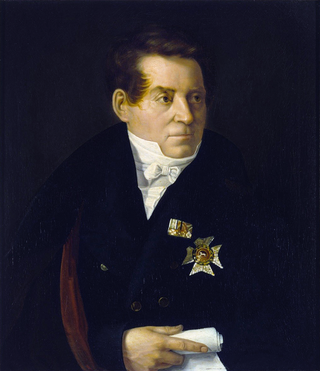
August WilhelmSchlegel, usually cited as August Schlegel, was a German poet, translator and critic, and with his brother Friedrich Schlegel the leading influence within Jena Romanticism. His translations of Shakespeare turned the English dramatist's works into German classics. Schlegel was also the professor of Sanskrit in Continental Europe and produced a translation of the Bhagavad Gita.

Albert Auguste Gabriel Hanotaux, known as Gabriel Hanotaux was a French statesman and historian.
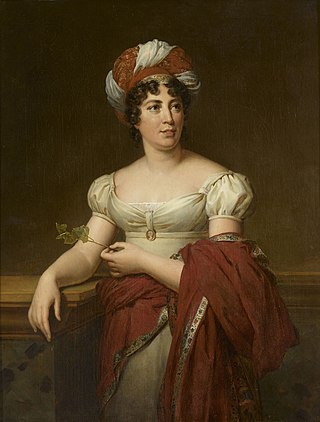
Anne Louise Germaine de Staël-Holstein, commonly known as Madame de Staël, was a French woman of letters and political theorist, the daughter of banker and French finance minister Jacques Necker and Suzanne Curchod, a leading salonnière. She was a voice of moderation in the French Revolution and the Napoleonic era up to the French Restoration. She was present at the Estates General of 1789 and at the 1789 Declaration of the Rights of Man and of the Citizen. Her intellectual collaboration with Benjamin Constant between 1794 and 1810 made them one of the most celebrated intellectual couples of their time. She discovered sooner than others the tyrannical character and designs of Napoleon. For many years she lived as an exile – firstly during the Reign of Terror and later due to personal persecution by Napoleon.

Joseph Marie, comte de Maistre was a Savoyard philosopher, writer, lawyer, and diplomat who advocated social hierarchy and monarchy in the period immediately following the French Revolution. Despite his close personal and intellectual ties with France, Maistre was throughout his life a subject of the Kingdom of Sardinia, which he served as a member of the Savoy Senate (1787–1792), ambassador to Russia (1803–1817), and minister of state to the court in Turin (1817–1821).

Jacques Auguste de Thou (Thuanus) was a French historian, book collector and president of the Parliament of Paris.

Phthalic acid is an aromatic dicarboxylic acid, with formula C6H4(CO2H)2. Although phthalic acid is of modest commercial importance, the closely related derivative phthalic anhydride is a commodity chemical produced on a large scale. Phthalic acid is one of three isomers of benzenedicarboxylic acid, the others being isophthalic acid and terephthalic acid.

Auguste-Henri Forel was a Swiss myrmecologist, neuroanatomist, psychiatrist and eugenicist, notable for his investigations into the structure of the human brain and that of ants. He is considered a co-founder of the neuron theory. Forel is also known for his early contributions to sexology and psychology. From 1978 until 2000 Forel's image appeared on the 1000 Swiss franc banknote.

Jacques-Victor-Albert, 4th duc de Broglie was a French monarchist politician, diplomat and writer.
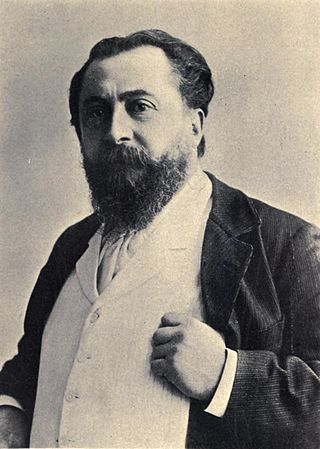
Catulle Mendès was a French poet and man of letters.

The Archdiocese of Paris is a Latin Church ecclesiastical jurisdiction or archdiocese of the Catholic Church in France. It is one of twenty-three archdioceses in France. The original diocese is traditionally thought to have been created in the 3rd century by St. Denis and corresponded with the Civitas Parisiorum; it was elevated to an archdiocese on October 20, 1622. Before that date the bishops were suffragan to the archbishops of Sens.

Afrikan Aleksandrovich Spir (1837–1890) was a Russian neo-Kantian philosopher of German-Greek descent who wrote primarily in German, but also French.
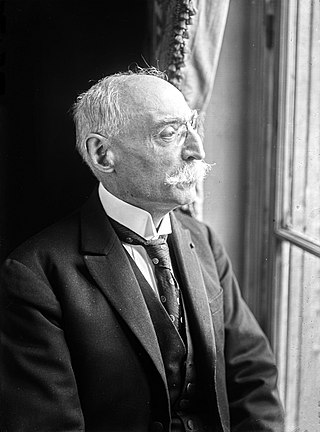
Émile Mâle was a French art historian, one of the first to study medieval, mostly sacral French art and the influence of Eastern European iconography thereon. He was a member of the Académie française, and a director of the Académie de France à Rome.

Abbé Auguste-Théodore-Paul de Broglie was professor of apologetics at the Institut Catholique in Paris, and writer on apologetic subjects.
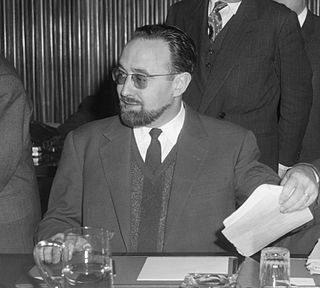
Edgard Edouard Pisani was a French statesman, philosopher, and writer.

Charles François Dominique de Villers was a French philosopher. He was mainly responsible for translating the philosophy of Immanuel Kant into the French language.

The Coppet group, also known as the Coppet circle, was an informal intellectual and literary gathering centred on Germaine de Staël during the time period between the establishment of the Napoleonic First Empire (1804) and the Bourbon Restoration of 1814–1815. The name comes from Coppet Castle in Switzerland.